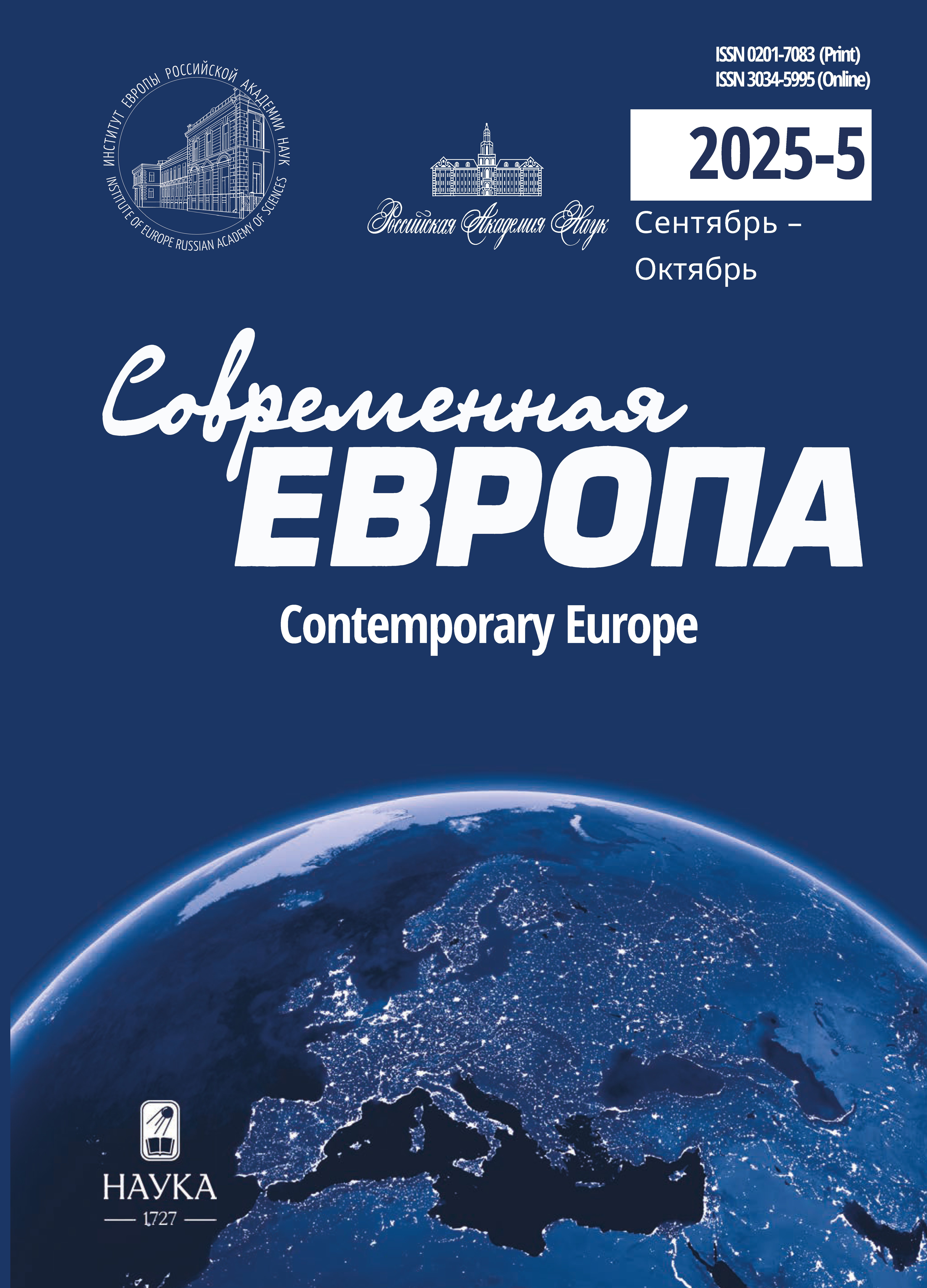Hungary in Search of a Place in Neo-Globality: Emphasis on Economic Neutrality
- Authors: Drynochkin A.V1,2
-
Affiliations:
- Moscow State University of International Relations (MGIMO University)
- Institute of Europe, Russian Academy of Sciences
- Issue: No 5 (133) (2025)
- Pages: 83-92
- Section: PROBLEMS OF ECONOMY
- URL: https://ruspoj.com/0201-7083/article/view/695688
- DOI: https://doi.org/10.31857/S0201708325050079
- ID: 695688
Cite item
Abstract
Against the backdrop of major and virtually revolutionary changes in the global landscape, the main strategic challenge for Hungary has become the development of mechanisms for integrating into future configurations of countries. One of these mechanisms has become the concept of economic neutrality of the country, which, according to the Hungarian authorities, allows for simultaneous acceleration of economic growth and compliance with national interests. The term "economic neutrality" designating this concept necessitated a study of the essence of the Hungarian concept, its theoretical justification and practical applicability. As a result of the study, the features of this concept were revealed, representing, on the one hand, a combination of economic principles of diversification of foreign economic relations and minimization of external political influence on decisions made at the national level; and, on the other hand, a combination of the ideological principles of the free market and the practice of dirigisme. The relatively weak theoretical justification for this concept is explained by the fact that the ideas combined in the Hungarian concept deal with theories based on opposing initial postulates. A study of the critical remarks caused by the compromise content of the Hungarian concept has shown that most of them are still superficial, which in turn is caused by the lack of practical experience in implementing the concept of economic neutrality, which is necessary for a full-fledged scientific analysis. The most significant criticisms relate to the area of risks associated with possible inaccurate forecasts regarding future country configurations in the global economy and underestimation of changes in the economic policies of the largest modern players. It is concluded that the concept of economic neutrality is a kind of constructor that allows for prompt changes to be made to Hungarian economic policy based on current geoeconomic and geopolitical dynamics.
About the authors
A. V Drynochkin
Moscow State University of International Relations (MGIMO University); Institute of Europe, Russian Academy of Sciences
Email: drinda-hu@yandex.ru
Doctor of Science (Economics), Professor; Leading Researcher Moscow, Russia; Moscow, Russia
References
- Азаренкова А.А. (2024) Теория и практика геополитического проектирования в современной Румынии. Вестник Российского университета дружбы народов. Серия: Политология. Т. 26. № 3. С. 543–555. DOI: https://doi.org/10.22363/2313-1438-2024-26-3-543-555
- Дрыночкин А.В., Сергеев Е.А. (2019) Современная модель взаимодействия Венгрии с иностранным капиталом в контексте «патриотического поворота». Современная Европа. № 7(93). С. 93‒104. doi: 10.15211/soveurope7201993104
- Селищев Н.Ю. (2024) Идеологическая мотивация и экономическая политика на примерах действий высшей бюрократии (часть 1). Вестник ЦЭМИ РАН. T. 7. Вып. 1. doi: 10.33276/S265838870030320-5
- Сергеев Е.А., Воротников В.В. (2023) Стратегия Европейского Союза в условиях глобальной перестройки: автономия или эвтаназия? МГИМО-Университет, Москва. 52 с.
- Сопилко Н.Ю., Морозов В.В. (2024) Глобальные проблемы трансформации мировой экономики в новую экономическую модель развития. Вестник РГГУ. Серия «Экономика. Управление. Право». № 4. С. 61–75.
- Чичманн Л. (2021) Внешняя политика Венгрии и кризис либерального международного порядка. Балансируя между мировыми державами и национальными интересами. Центральная Европа: тридцать лет по пути реформ. Проблемы, вызовы, перспективы. Под ред. Л.Н. Шишелиной. Институт Европы РАН, Москва. С. 253–261.
- Bourdieu P., Boltanski L. (1976) La production de l’idéologie dominante. Actes de la recherche en sciences sociales. No. 2/3. P. 4–76.
- Heath J.B. (2024) Neutrality and Governance in a Weaponized World. American Journal of International Law. No. 118(3). P. 566–585. doi: 10.1017/ajil.2024.28
- Lebaron F. (2000) The Space of Economic Neutrality: Types of Legitimacy and Trajectories of Central Bank Managers. International Journal of Contemporary Sociology. Vol. 37. No. 2. P. 208–229.
- Liberto D. (2024) Neutrality of Money Theory: Definition, History, and Critique. Investopedia. 04.06. URL: https://www.investopedia.com/terms/n/neutrality_of_money.asp (дата обращения: 18.02.2025).
- Mariotti S. (2025) “Open strategic autonomy” as an industrial policy compass for the EU competitiveness and growth: The good, the bad, or the ugly? Journal of Industrial and Business Economy. No. 52. P. 1–26. DOI: https://doi.org/10.1007/s40812-024-00327-y
- Swedberg R. (1986) The Doctrine of Economic Neutrality of the IMF and the World Bank. Journal of Peace Research (PRIO Peace Research Institute Oslo). No. 23(4). P. 377–390.
- Wylie N. (2002) European neutrals and non-belligerents during the Second World War. Cambridge University Press, Cambridge, UK. 382 p.
Supplementary files











